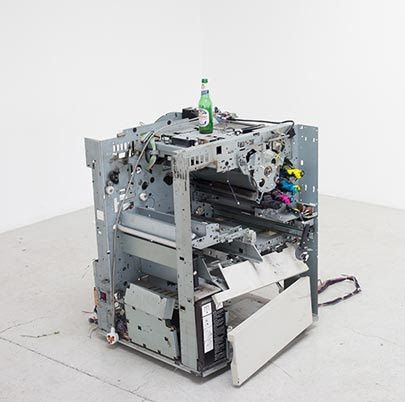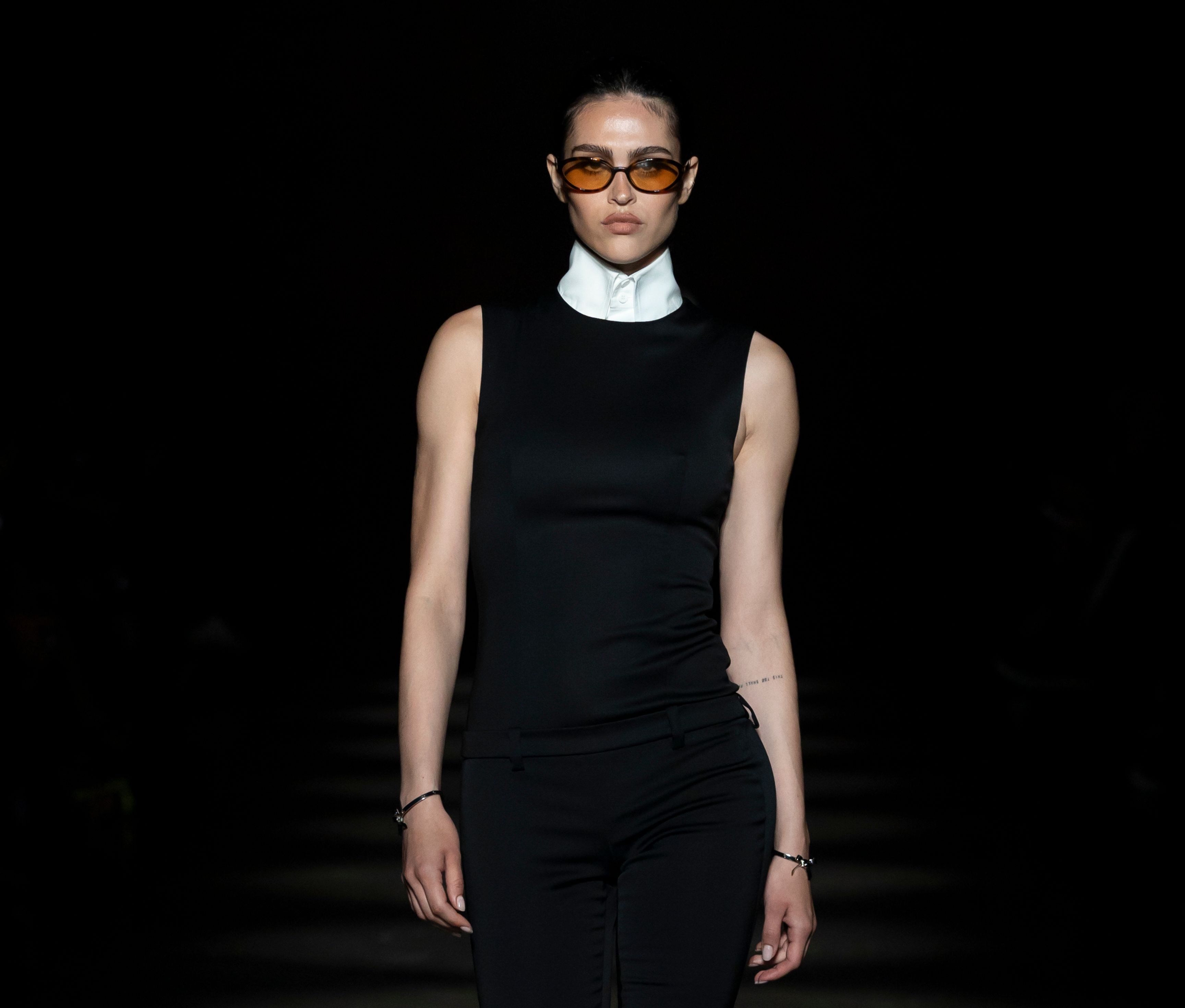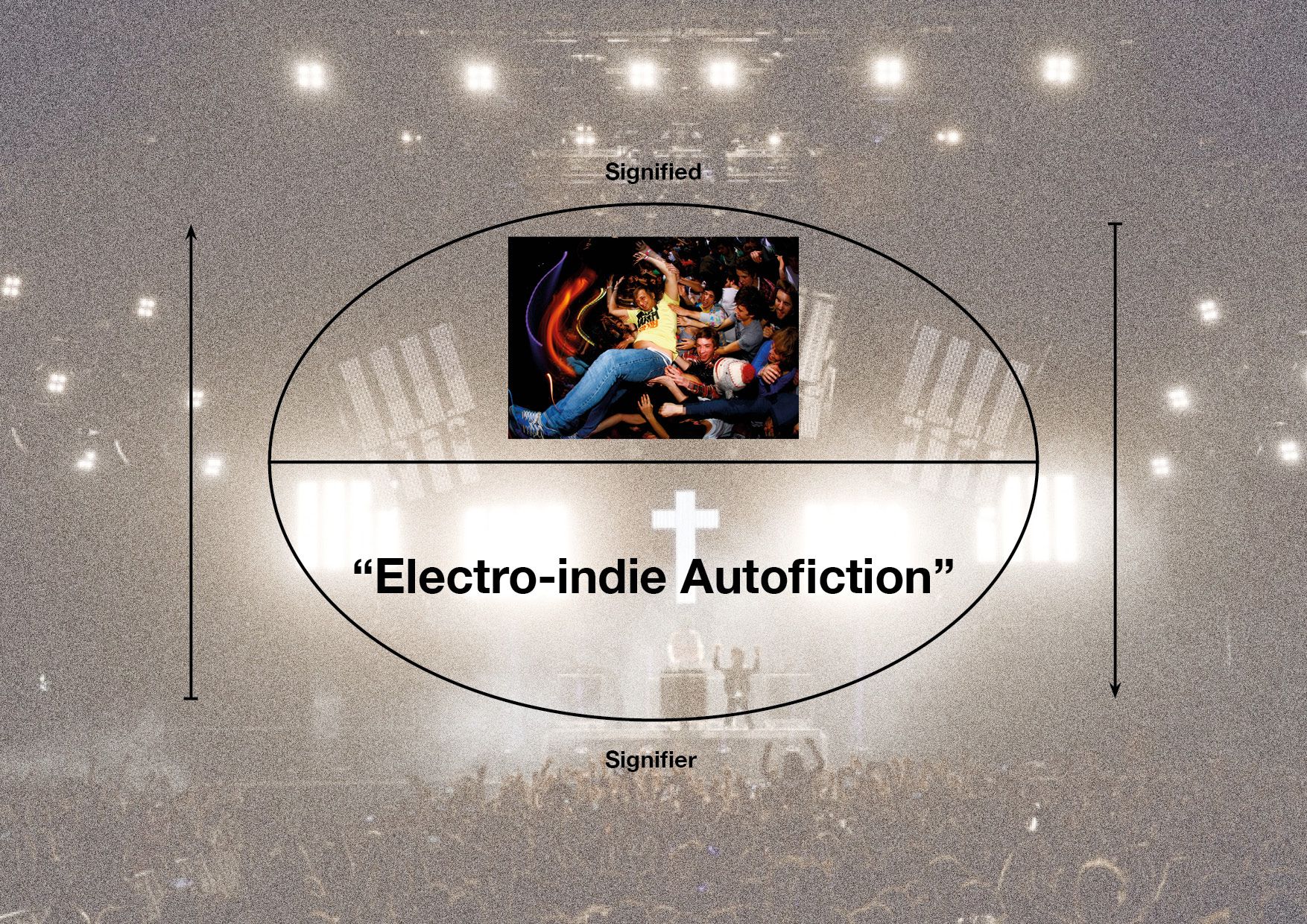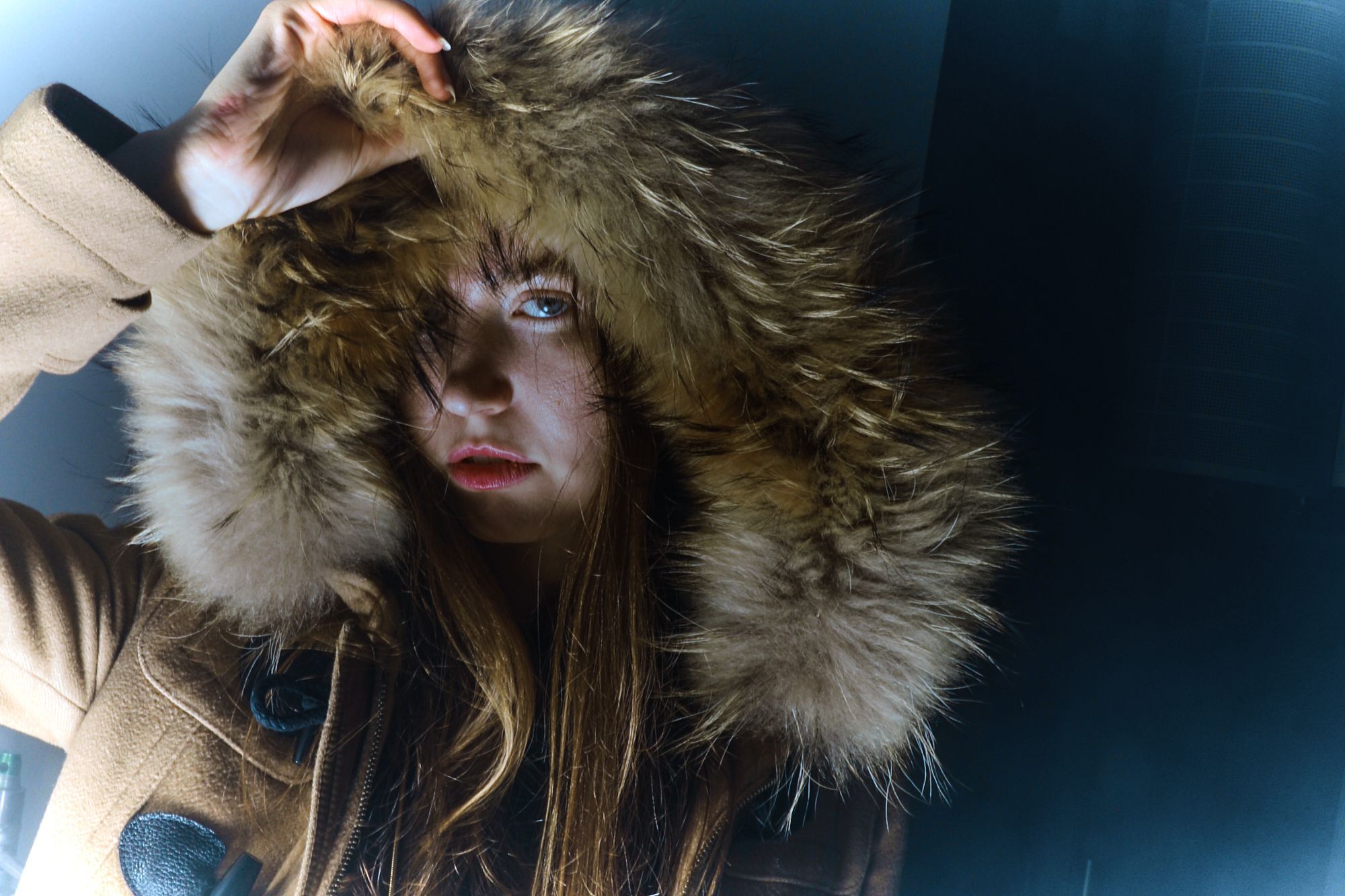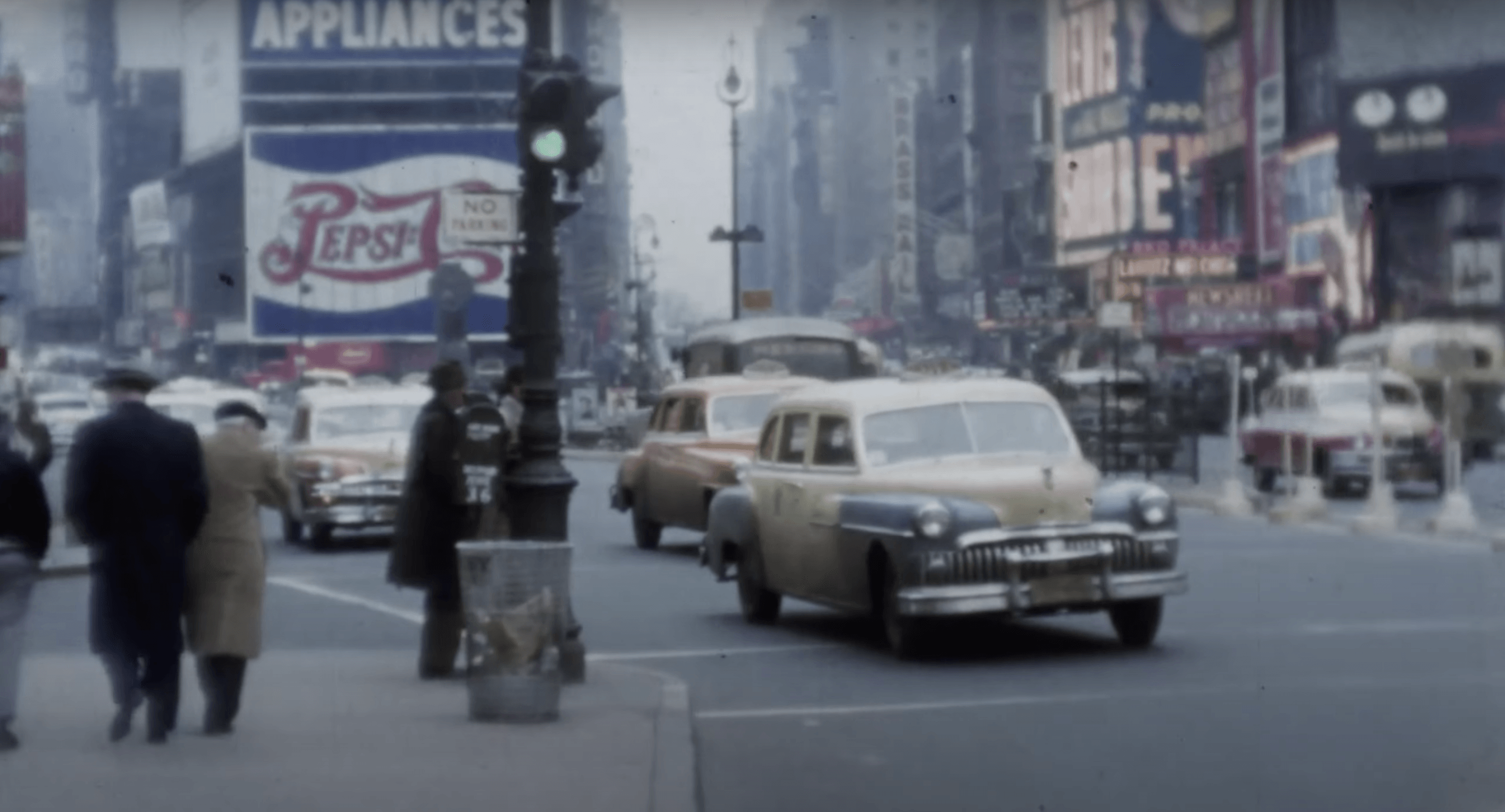With Love From Death Beach, Casey Spooner
|PHILLIP PYLE
“I’m more of a nudist, transcendental warrior now,” artist and musician Casey Spooner says. His new album, With Love From Death Beach, would then be his Walden—that is, if you can imagine Thoreau living on a nudist beach in Oaxaca instead of the New England woods and having a bad experience with hash edibles.
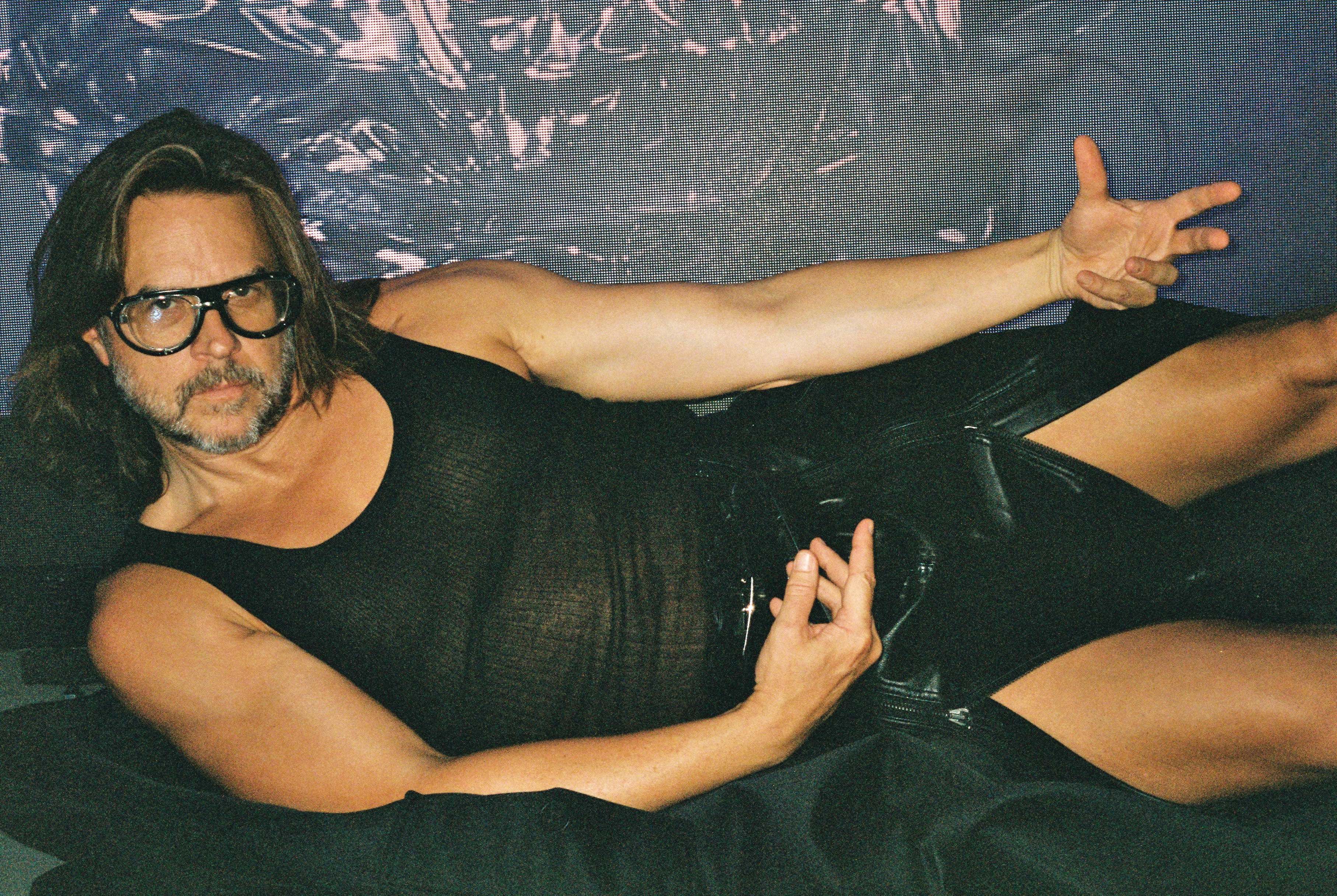
top TALENT'S OWN, pants 032c “SINGULAR” LEATHER ZIP TROUSERS
Spooner says this as a way of differentiating his current persona from his previous one. SPOONER2020, the world-building character, which he describes as “presidential with a complete custom-made Prada wardrobe,” was born with an eponymous 2020 single that begins, “I love my country / And I love your country too / My name is Casey Spooner / And I'm running for President.” Spooner did in fact initiate a mock US presidential campaign around his SPOONER2020 project, melding music, video, performance, clothing, and art objects as a kind of campy Gesamtkunstwerk that will soon be presented in an exhibition format in Berlin. If SPOONER2020 was rooted in a playful form of politics—even despite its more serious maxims, which include the declaration that “the most American thing you can do is to revolt, is to rise up, and is to fight”—then With Love From Death Beach began from a place of isolation and turmoil. Influenced by Spooner’s experiences during lockdown and the horror that has continuously engulfed the world since, the resulting 11-track dance album is a meditation on ends—of life, love, sex, history, and civilization. The album’s opening spoken word sequence, pulled from The Radiance Sutras, form both an introduction to the bleak yet vigorous world of Spooner’s creation and a framework through which to read the times: “Imagine the entire world consumed by flames, stay steady, do not waiver…”
First establishing himself with Fischerspooner, the electroclash duo of Spooner and Warren Fischer, which first formed in Chicago in 1998, the now Berlin-based artist has developed a practice spanning experimental theater, film, music, and performance. He’s also well acquainted with fashion, through his work with designers such as Gareth Pugh and Hedi Slimane and, more recently, with 032c Readytowear. Last month, Spooner made his Paris runway debut in the 032c Spring/Summer 2025 show to the sound of his own voice. He was the second look (and first men’s look) in the show, following Amelia Gray as he walked to Fischerspooner’s “Emerge,” which played repeatedly as part of the show’s mantra-like soundtrack.
Ahead of the release of With Love From Death Beach, Casey Spooner talked with Phillip Pyle about the sex party that inspired the album, the relationship between death and eroticism, and the serendipity of his involvement in the 032c Paris show.
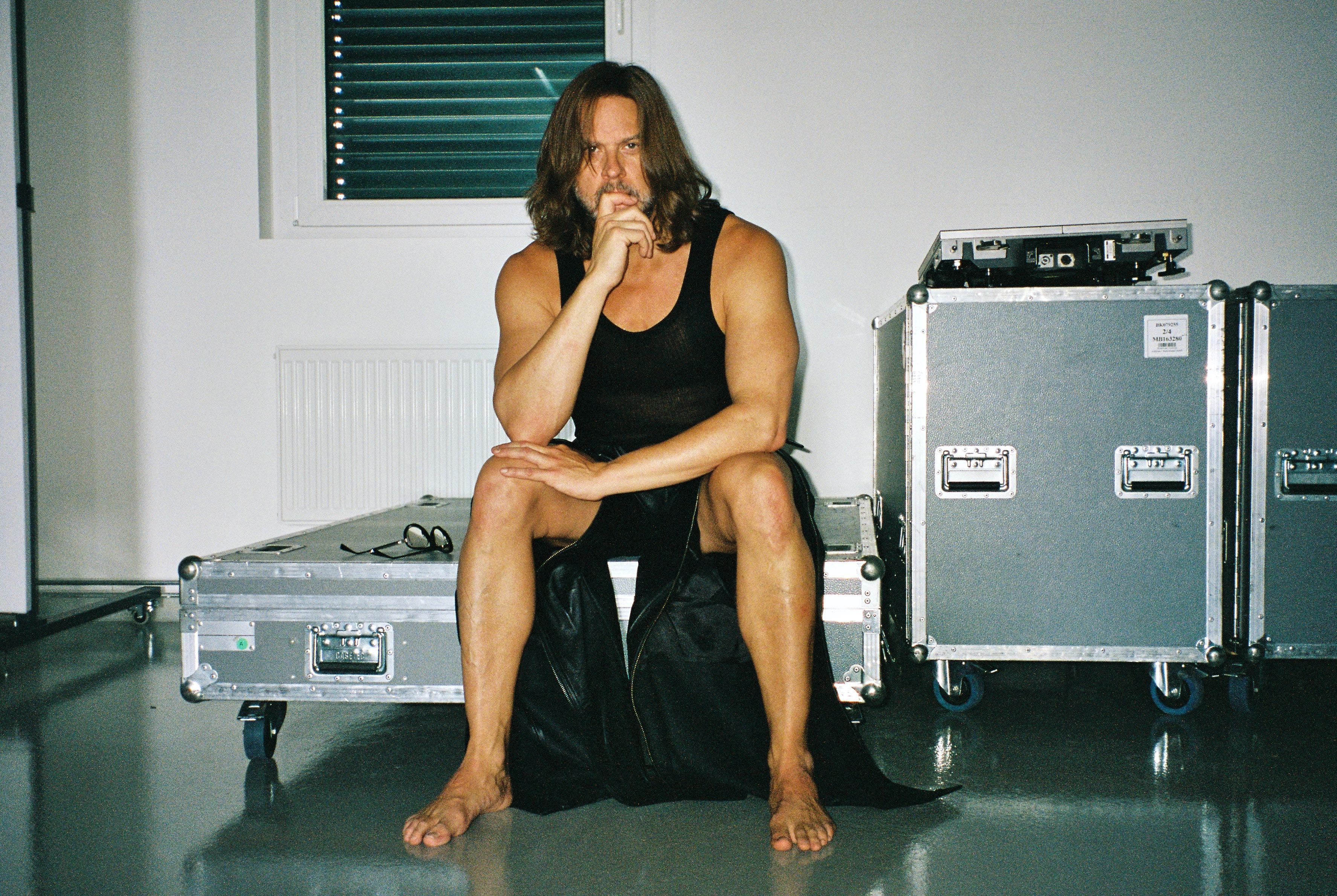
PHILLIP PYLE: You wrote and recorded With Love From Death Beach on a nudist beach in Mexico. What did that process actually look like? How much of it was actually recorded on beach and in the nude?
CASEY SPOONER: I wasn’t recording in the nude, nude. Minimal clothing, I would say; being fully naked isn’t necessary at all times.
When I make a body of work, I start with a character and a theme. During the pandemic, I didn’t know what to do creatively or how to react to the times. Before the pandemic, I traveled a lot. My life was very active, and then all of a sudden, I was locked in a house in real isolation—emotionally, physically, sexually—in every way. It was a very intense shift for me.
Then, this friend of mine came to town, and we lived together for a couple months. He’s super sexual, very outgoing, very social, and he pulled me out of my darkness in many ways, one of which was by hosting a sex party. Not druggy, not freaky, not after hours. We did a naked yoga class, then invited a couple of friends over, and there were five people having sex together on a Wednesday. I tend to be an orgy mom, so I dealt with the catering, music, and lighting, making sure that everybody had poppers, lube, and clean towels. I don’t need to be completely lost in a sexual frenzy for hours. I started singing, “We’re all going to die, so let’s fuck.” I was like, oh my God, that’s like a primal instinct. I was having to confront my mortality, and something about confronting my mortality made me more sexually charged. I then realized I wanted to explore the themes of sex and death specifically. I always thought that was a morbid or teenage angst kind of theme. I didn’t think it had any real philosophical import but apparently it’s a very classic Greek theme called Eros and Thanatos.
I ended up going by chance—and very last minute at the behest of some friends—to Playa Zipolite in Oaxaca. When I got there, I found out that Zipolite is a pre-Spanish Zapotic word meaning “beach of the dead.” I was thinking about sex and death, and then I ended up at the beach of the dead—at the end of the beach, there’s Playa del Amor, where everyone has sex. That happened in January. I went there for New Year’s with a one-way ticket. I was planning to stay for a week and stayed for three months. After the first two or three weeks, the theme and the character locked in.
PP: It’s funny that you mentioned Eros and Thanatos because I was talking to a friend yesterday about the life and death drive in relation to sex, and how they’re often not discussed in relation to queerness. It’s been talked about at length in heterosexual terms, as a kind of reproductive life drive, but I think that the same thing happens in queer relationships, too—this sexual urge arising out of existential or morbid feelings.
CS: My grandmother passed away in isolation in a nursing home in Georgia during the pandemic. She was 99 years old and the matriarch of the family. We had been bracing for it because she was old, but she was also very hardy. I was looking forward to her 100th birthday. When I got the phone call from my father saying that she passed away, it was a surprise, because she wasn’t in poor health. Then, I immediately felt super sexual, which took me by surprise. I had a lot of weird feelings about it. Why would I be horny when my grandmother dies? Maybe it’s a primal urge when the matriarch of a family passes for the heirs to have some instinctual impulse from a subcortical part of the brain that says it’s time to procreate.
I also love the line, “My desire is endless and my decay is inevitable.” So much of my work has been about trying to understand my desire in the face of fear, shame, and repression. To come to the understanding that I will never fully comprehend or exhaust my desires—and that I will always be reaching, even as I collapse—is one of the most poignant and beautiful parts of living. It feels like Mishima or something.
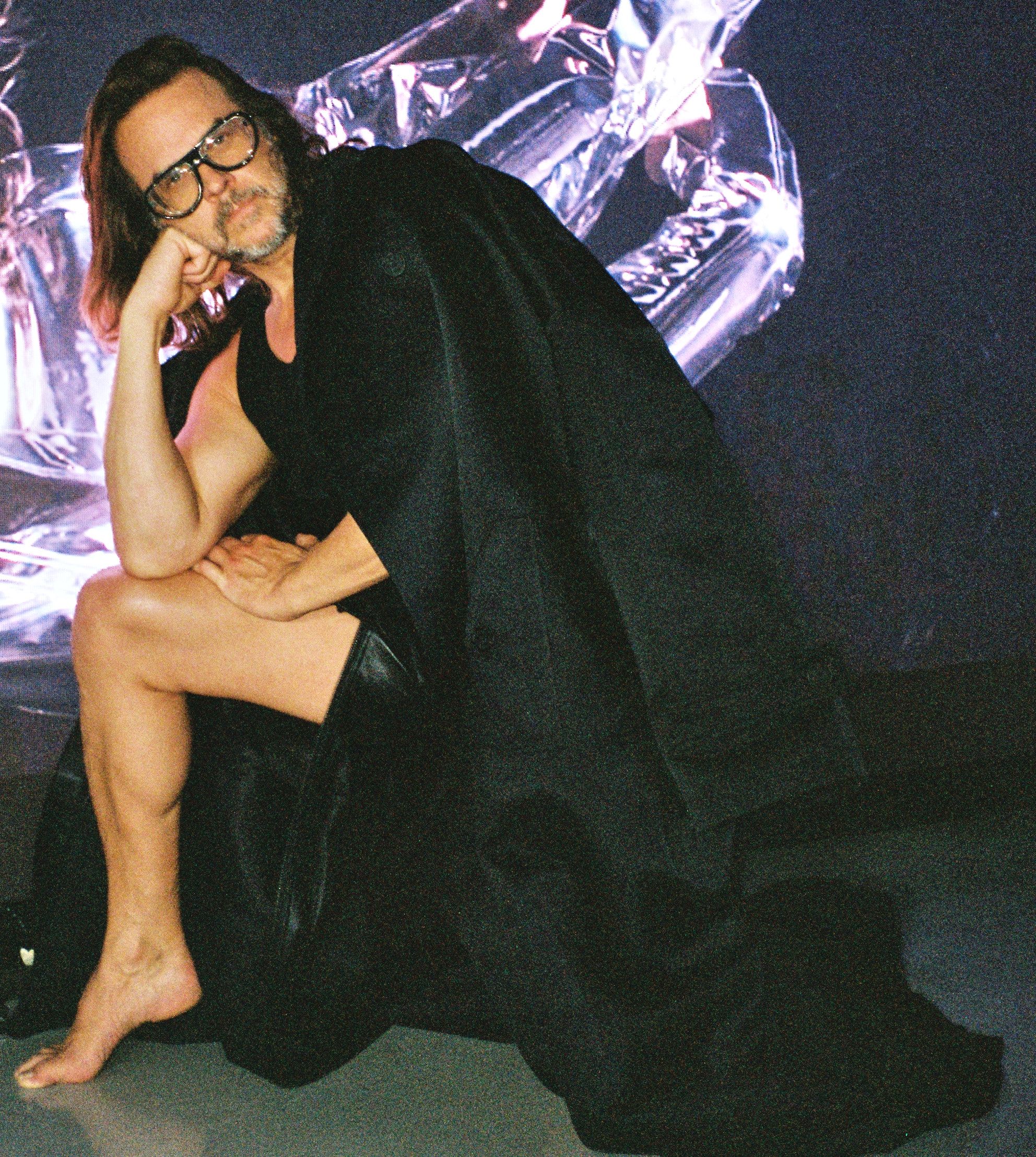
PP: Were there other psychological themes that emerged once you got to the beach and started writing the songs?
CS: I was planning for the reconvening of society. I was optimistic about everyone having this completely new sense of value and community, and that we would come together in glorious celebration out of isolation. I was planning to make something profound but essentially optimistic.
Then, the producer [Julian Stetter] flew in, and we met in Mexico City. We recorded a little bit in a studio there just to warm up in a proper environment. I was very nervous because I hadn’t performed, written, or sang in a studio for almost two years. I didn’t know if I had a voice anymore. What was amazing was that Julian would pull up a track and I would start singing, then after like three takes we had a song. He’d be like, “Okay, great, next song.” I wrote six songs in one day.
We recorded for one or two days, then Julian came down with Covid-19. He went into isolation, and we lost a week of recording. I only had the budget for a total of two weeks of recording. He finally made it to the beach, and we set up. On the first day, things were going great in the shack. I like to smoke just a little bit of weed, not a lot. I went to this coffee shop, and they had these chocolates that the guy in the coffee shop said had hash in them. I asked the dosage and he said one chocolate per person. We drank the coffee, ate the chocolate, and started recording. It was going great, then all of a sudden, I started feeling a bit of vertigo. At the moment that I said, “I’m feeling a little uneasy,” Julian looked up in his very Germanic way and said, “I cannot continue to work. I am too high.” Let me tell you, we got dosed so hard. Thank God his sister was visiting. His sister had to come pick him up from the restaurant that we ended up at with friends. I was so high. I was like, “I need all of you to hug me at the same time right now.” I passed out, then I woke up retching. I ran down the beach and I threw up more. It was the most intense purge in the ocean.
That was a Saturday. We took Sunday off because we were both beat, but the chain of events that Sunday night were crazy. We were supposed to DJ a party on the beach, and there ended up being this fight in the middle of this beach party. It was super violent, horrific. There was a dude that wandered onto the dance floor covered in blood. The gig got canceled. Everyone wandered away. Someone else had to call an ambulance. I walked home down the beach. I wrote a song alone walking on the beach that night, then within two days the Russo-Ukrainian War escalated. My optimism and my euphoric fun album got completely obliterated.
PP: This album is quite a detour from your SPOONER2020 character. I can imagine that being queer from Georgia instills a very specific relationship to national politics, maybe one where camp feels like the natural way to engage with things. How do you separate that line between play and seriousness when it comes to the urgency of American issues?
CS: The thesis and the theme for that body of work was about how politics and entertainment have become the same thing. Especially in the United States, where a reality TV star became president by using negotiation skills and tactics that he learned from the entertainment business. I saw a really bad infomercial for Trump when the midterm elections were happening in 2018. It was such crazy, cheap, egregious propaganda. It was like this 1-800-thank-your-president call-in line. I just couldn’t believe it was reality. This is really the state of affairs, this is where we are.
Around the same time, I was at a Cat Power show at Brooklyn Steel in this meditative state. I kept thinking, I could make a better commercial. When I make a body of work, I basically make a campaign. I love to make short films, long films, performances, public speaking, costumes. I thought, I could make a better campaign. I can make a better president. Then, I was like, fuck it, I guess I’m just going to run. I’m going to make a mock presidential campaign. The thing that I am proud of is that I launched an OnlyFans with the presidential campaign. I wanted to point a finger at the hypocrisy of the patriarchy, with all the Epstein and prostitution news—and this was before Stormy Daniels. There’s this incongruity where these people are using evangelical Christian beliefs to repress and control people but, behind doors, they’re whores. I was like, why can’t we have a president that is just openly sexual without shame? I’m not very good at OnlyFans because I hate seeing myself on camera, so there’s only two videos but theoretically it was great.
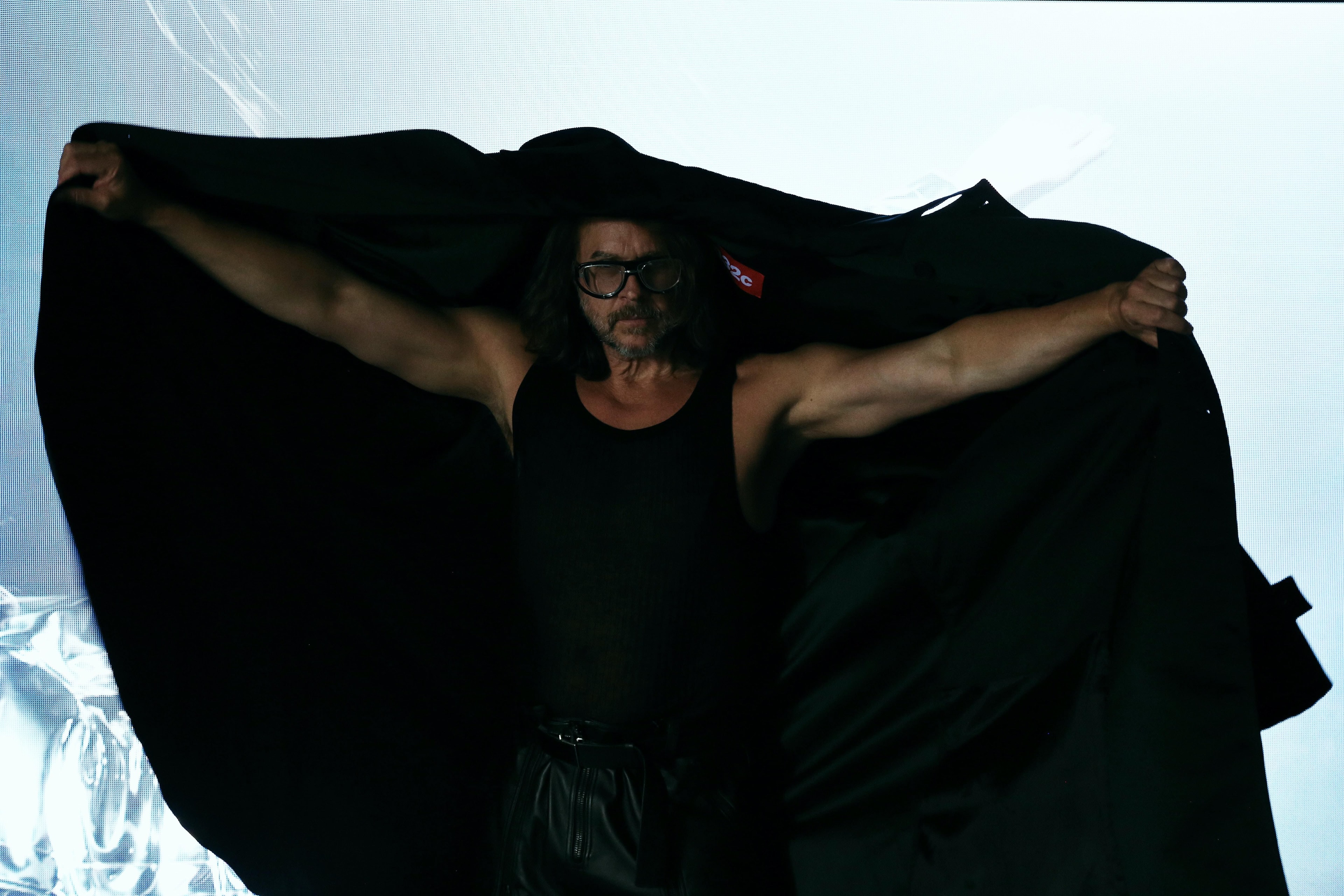
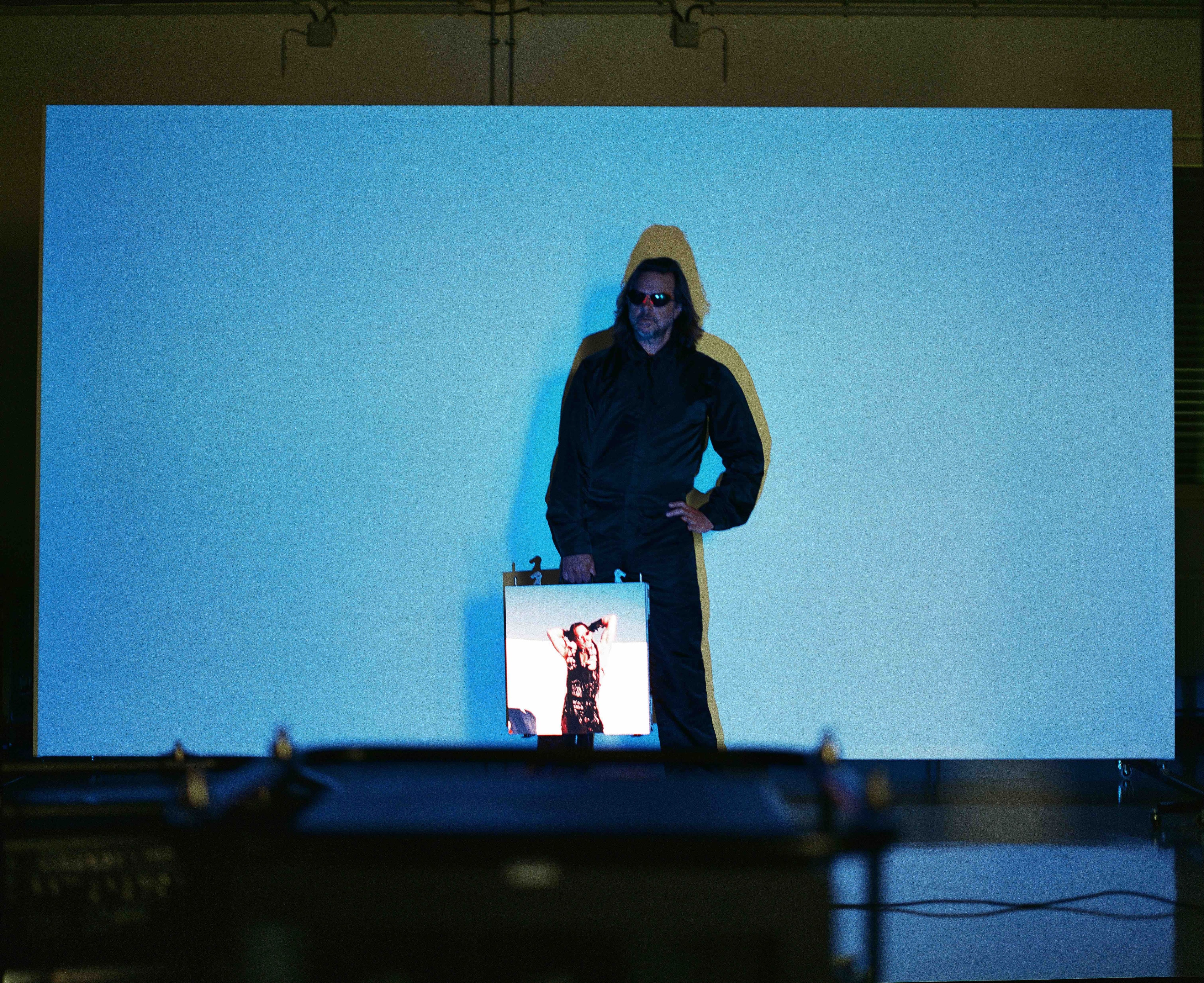
jacket 032c “SUPERSIZE” TRENCHCOAT
PP: You recently walked the 032c Spring/Summer 2025 show to your own voice. How did that feel?
CS: It’s like a gay boy’s fantasy to walk the runway in Paris, so I’d say it’s a dream that has been in my heart for most of my life. I had done other fashion shows. I did one of Gareth Pugh’s first shows wearing this crazy light-up dress where they strapped a power cord to my leg. I had to sign a release that said if I got electrocuted, nobody could get sued—and I signed it because I thought, if I die on the runway in a Gareth Pugh light-up dress, I’m done, I’m out. Legend.
Modeling is wild because it’s not theater. I’ve done all kinds of theater, including very organized experimental theater with the Wooster Group, and modeling is weirdly punk in a way. I was the first look in the men’s show. They kept the five of us [Amelia Gray, Casey Spooner, Mona Tougaard, Alex Consani, and Alton Mason] kind of separate from the rest of the models in a changing area. It was crazy to talk to everybody. Alex’s energy was great. She had a great sense of humor. She was like: “Girl, do you want me to give you some energy? You need some energy. I’m going to give you some energy.”
The thing that I loved about walking to “Emerge” is that I created that word in the song, “Hyper-media-ocrity,” to be about embracing clichés as a method of power. Then, the mantra in the song is meant to be this enigmatic yet simple, "Sounds good, looks good, feels good too.” What was crazy is that I was on this mantra thing, and Maria said that she told Michel Gaubert she wanted “Emerge” to be edited like a mantra. So, I had just made a mantra album, then they had turned my most famous song into a mantra, which I didn’t even know until the day of the show.
PP: Is fashion something that you want to continue exploring? It does combine the elements of performance and sound that that you’ve long been interested in.
CS: I’ve always had a funny relationship with fashion. I’ve been in fashion, then completely out of fashion, then back. It’s just vicious. You don’t know when you’re in, you don’t know when you’re out. Also, it was such a mysterious system 20 years ago. It was more niche and this obscure performance world. Hedi Slimane was dressing me when he was at Dior and I was going to shows and sitting front row. I was always a little bit disappointed because I was like, “I’m a performer, why aren’t you casting me?” Now that I’ve kind of been on the other side, I see how it’s different.
I’m fascinated by runway performance because it’s such a minimalist performance. They’re literally just walking. So, I’m always fascinated by the question of how you can do that badly or do that well. Now that I’ve done it, I feel like I did okay, but I didn’t have some moment where I felt like I turned into a panther on the runway. It’s weird, I feel more like a diva bitch just in my everyday life walking to the grocery store.
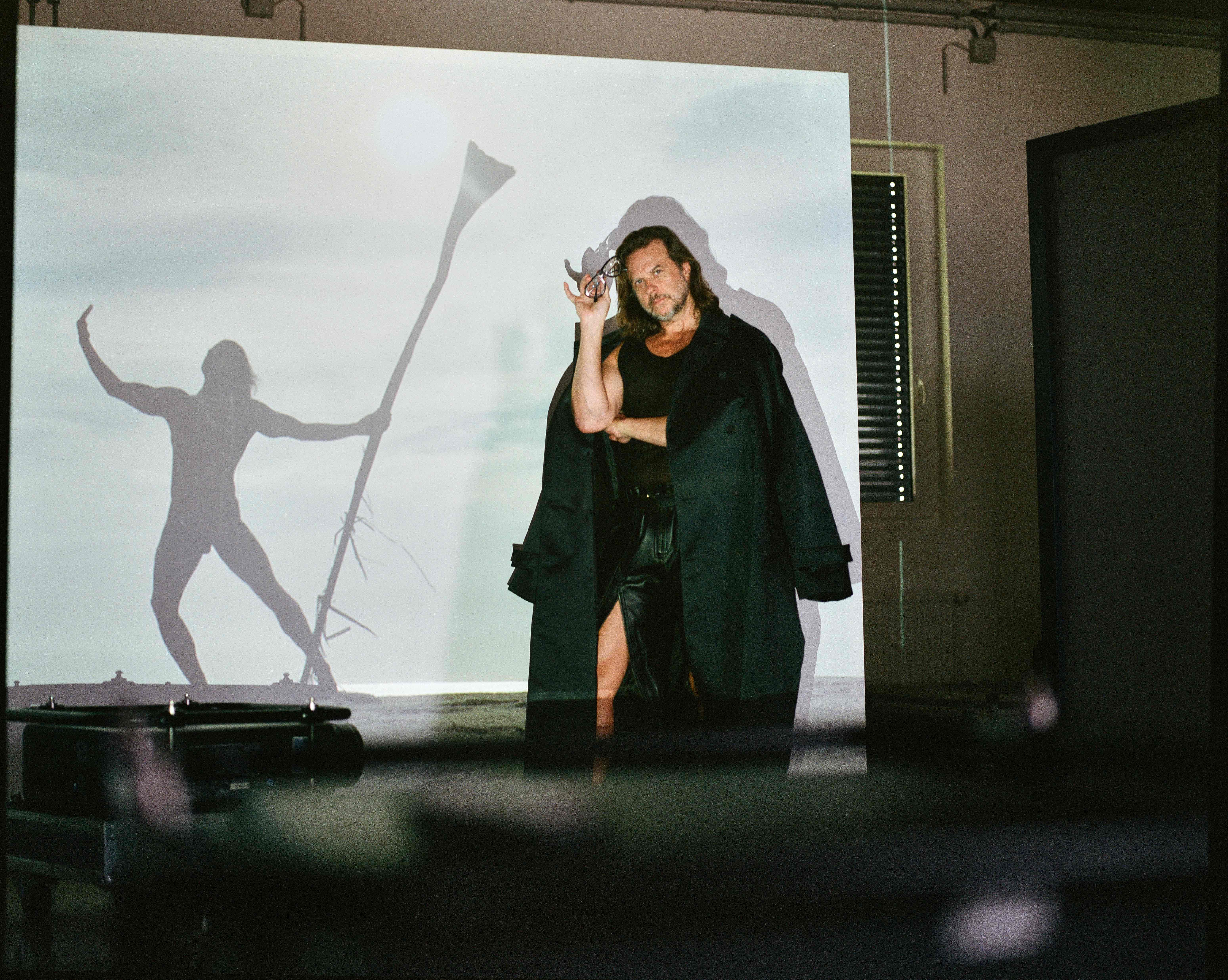
Credits
- Text: PHILLIP PYLE
- Photography: ALMA LEANDRA
- Location: EIDOTECH
